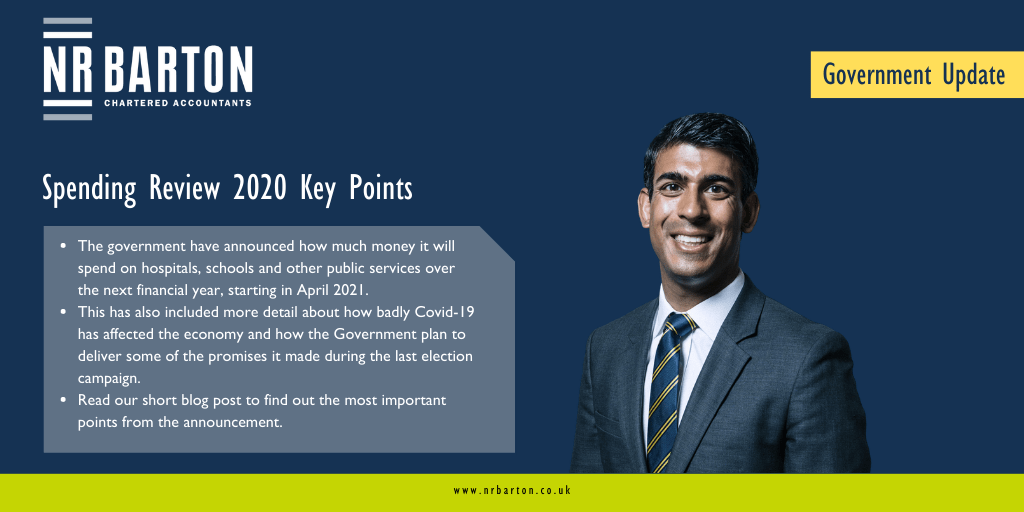Rishi Sunak says the spending review comes as the coronavirus health emergency is not over and the economic emergency has only just begun. The Chancellor has said he will prioritise jobs, businesses and public services. He reported that the Government is spending £280bn to get the country through Covid-19.
Next year, the government will allocate an initial £18bn in response. There will be £3bn for the NHS, £2bn for keeping transport running, £3bn to local councils, and extra £250m to end rough sleeping. The total funding to tackle coronavirus will be £55bn.
Growth
- The chancellor says forecasts from the Office for Budget Responsibility (OBR) show the economy will contract by 11.3% this year, the biggest decline in three centuries.
- Sunak says it will take until the end of 2022 for the economy to return to its pre-pandemic size.
- GDP will grow by 5.5% next year, 6.6% in 2022, 2.3% in 2023, 1.7% in 2024 and 1.8% in 2025.
- In July, the OBR said its “central scenario” was for a 12.4% plunge in gross domestic product (GDP) this year.
- This compares with estimates made at the start of November from the Bank of England for an 11% fall in 2020.
Borrowing
- Sunak says the budget deficit will be £394bn this year, or 19% of GDP – the highest level in peacetime.
- Borrowing will remain at £164bn next year and remains at about £100bn for the remainder of the forecast.
- In July, the OBR estimated a budget deficit – the gap between spending and tax income – of £322bn for 2020-21.
- The OBR had previously estimated the national debt – the sum total of every budget deficit – of £2.2tn in 2020-21, or 104.1% of GDP
Public sector pay
- Pay rises for the public sector will be paused next year, with an exemption for more than 1 million nurses and doctors in the NHS.
- 1 million public sector workers who earn below the median wage of £24,000 will be guaranteed a pay rise of at least £250.
- Sunak says he cannot justify a significant across-the-board pay increase for public sector workers, to protect public sector jobs and ensure fairness between the public and private sectors.
- The chancellor says the national living wage will be increased to £8.91 an hour, and extended to over-21s.
- Overall unemployment is forecast to peak next year at 7.5%.
Departmental spending
- Sunak says day-to-day departmental spending will rise in real terms by 3.8%, the fastest growth rate in 15 years.
- He says in cash terms, this will be an increase of £14.8bn on current levels.
- The government will match EU funding for regional development after Brexit, he says. Funding for communities to pilot programmes will be made next year.
- The core health budget will grow by £6.6bn. The chancellor says this will help to hire 50,000 new nurses.
- The schools budget will increase by £2.2bn.
Overseas aid
- Sunak says the government will cut the overseas aid budget to 0.5% in 2021, allocating £10bn at this spending review.
- The intention is to return to 0.7% “when the fiscal situation allows”.
- The chancellor says during a “domestic fiscal emergency” sticking rigidly to spending the international commitment of 0.7% on overseas aid is difficult to justify to the British people.
and levelling up
- Sunak says investment in infrastructure will total £100bn next year, with plans to deliver the highest levels of sustained investment in 40 years.
- He confirms plans to launch a new infrastructure bank, to be headquartered in the north of England.
- The chancellor announces a new £4bn fund for “levelling up”, to which any local area can bid for the funding of local projects.
The “levelling-up fund” is clearly intended as the good news at the end of a difficult statement and is likely to prove popular.
We have all had a very challenging year and there are inevitably tough times ahead for people, businesses and the economy. Rishi Sunak stated, “our health emergency is not yet over, and our economic emergency has only just begun”. The points outlined in the spending review show that the government are prioritising the protection of both people’s lives, and livelihoods.
If you have any questions regarding how the points mentioned above may affect you or your business, please contact your usual Partner or Manager, who will be happy to help.


